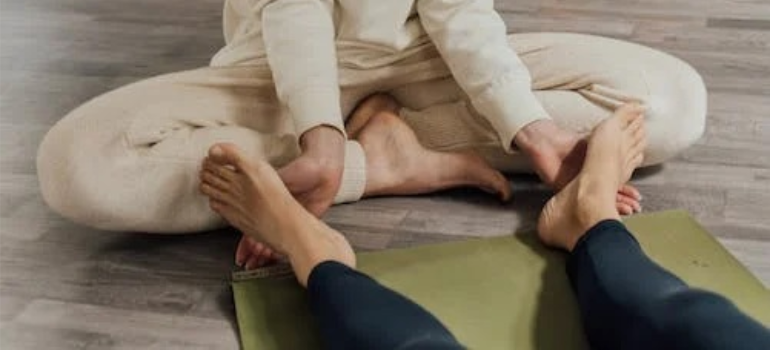As the field of addiction treatment advances, an array of alternative therapies has emerged as potent therapeutic tools. This range of alternative therapies can complement and enhance the effectiveness of standard interventions with demonstrable effectiveness. Alternative therapies for addiction provide non-invasive and non-pharmacological approaches, bringing unique benefits to the recovery process. By integrating modalities such as acupuncture, meditation, yoga, art therapy, and more, addiction treatment providers can empower individuals to explore new avenues of healing and self-discovery.
At Harmony Ridge Recovery, our West Virginia treatment center, we fully embrace the holistic approach to recovery. Our commitment to it means we provide ample opportunities for individuals to engage with these alternative therapies throughout our programs, fostering a well-rounded and transformative recovery experience.
What Are Alternative Therapies for Addiction?
Alternative therapies are also known as complementary or integrative therapies. They encompass a diverse range of non-conventional treatments that can be utilized alongside traditional approaches to addiction treatment. These therapies are characterized by their non-invasive nature, as well as their focus on addressing the individual’s physical, mental, and emotional well-being.
One of the primary benefits of alternative therapies is their holistic approach. They recognize the interconnectedness of mind, body, and spirit. Thus, they aim to restore balance and promote self-healing, complementing traditional addiction treatments by addressing various aspects of an individual’s life.
Notable examples of alternative therapies include:
- Acupuncture, which targets specific energy points to promote relaxation and pain relief;
- Mindfulness meditation, which cultivates awareness and reduces stress;
- Yoga, which combines physical postures, breathing exercises, and meditation to enhance physical and mental well-being;
- Art therapy, which utilizes creative expression to facilitate emotional processing and self-discovery;
- Equine-assisted therapy, which involves interactions with horses to promote personal growth and emotional healing.
These alternative therapies offer individuals battling addiction unique and empowering tools to supplement their recovery journey, fostering a more comprehensive and transformative healing process. By embracing the principles of alternative therapies, individuals in addiction recovery can tap into new avenues of self-discovery, inner strength, and lasting wellness.

The Importance of a Holistic Approach to Recovery
A holistic approach to recovery from addiction holds immense importance in addressing the multifaceted nature of substance abuse and its underlying causes. By embracing the “mind-body meld,” holistic approaches recognize the interconnectedness of physical, mental, and emotional well-being.
Traditional addiction treatments often focus primarily on the physical aspects of addiction, such as detoxification and medical interventions. However, holistic therapy for addiction aims to heal the body and mind simultaneously, understanding that psychological well-being plays a vital role in achieving long-lasting recovery.
Alternative therapies for addiction, such as mindfulness practices, yoga, and art therapy, can be invaluable in this regard. These therapies provide individuals with psychological tools to explore and process their emotions, develop coping mechanisms, and cultivate self-awareness. By addressing the psychological aspects of addiction, holistic approaches help individuals identify and heal the root causes of their substance abuse, leading to more sustainable recovery outcomes.
Therefore, integrating alternative therapies into addiction treatment not only enhances the overall effectiveness of interventions but also empowers individuals to take an active role in their healing process. By nurturing the mind and body together, a holistic approach paves the way for comprehensive recovery, fostering personal growth, resilience, and a renewed sense of well-being.
Alternative Therapies for Addiction
With the above in mind, here we can outline the most notable alternative therapies that facilitate a holistic approach to recovery. All of the following offer promise throughout the recovery journey, as NIH’s research illustrates.
Acupuncture
Acupuncture is a renowned alternative therapy often utilized in addiction treatment due to its potential benefits. Originating from traditional Chinese medicine, acupuncture involves the insertion of thin needles into specific points of the body to promote balance and healing. Programs for substance abuse treatment WV offers may often incorporate this type of therapy.

In addiction treatment, acupuncture can help alleviate withdrawal symptoms, reduce cravings, and support overall well-being. By targeting specific energy pathways, known as meridians, acupuncture aims to restore the flow of vital energy, or qi, throughout the body. This process can help individuals in recovery by addressing imbalances caused by substance abuse and promoting relaxation and pain relief. Furthermore, acupuncture has been found to reduce stress and anxiety, enhance mood, and improve sleep quality, which are often areas of concern for individuals in recovery.
However, it is important for those struggling with addiction to exercise caution when considering acupuncture as a treatment option. Individuals should ensure that they receive acupuncture from a licensed and qualified practitioner experienced in addiction treatment. Additionally, it is crucial to communicate openly with the practitioner about one’s addiction history, as certain points may need to be avoided or modified to prevent triggering any potential relapse triggers.
Meditation
Equally common among alternative therapies for addiction is meditation. Meditation, a widely recognized alternative therapy, often facilitates a holistic approach to recovery. This ancient practice involves focusing one’s attention and achieving a state of mental clarity and emotional calm.
Meditation offers numerous benefits for individuals in recovery. Firstly, it plays a crucial role in stress reduction, helping individuals manage the overwhelming emotions often associated with addiction. By cultivating mindfulness and present-moment awareness, meditation also allows individuals to develop a healthier relationship with their thoughts and cravings, ultimately reducing the likelihood of relapse. Moreover, meditation enhances mental clarity and cognitive function, supporting individuals in making informed decisions and maintaining sobriety. Thus, meditation may often accompany a CBT treatment plan for substance abuse.
There are various meditation techniques and practices that can be incorporated into addiction treatment. Mindfulness meditation, for instance, involves observing one’s thoughts and sensations without judgment. Guided meditation, on the other hand, utilizes audio recordings or a teacher’s guidance to lead individuals through a meditation session.

Integrating meditation into one’s daily routine is essential for reaping its long-term benefits. Starting with short sessions and gradually increasing the duration can help individuals establish a consistent practice. Additionally, integrating meditation into daily routines, such as practicing it upon waking or before bed, can help make it a regular habit.
Yoga
Yoga, a widely embraced alternative therapy, also holds significant potential in addiction treatment, addressing both the physical and mental aspects of recovery. Rooted in ancient Indian philosophy, yoga combines physical postures, breath control, and meditation to promote holistic well-being.
Yoga is one of the most common alternative therapies for addiction, as it offers numerous benefits for individuals in addiction recovery. Physically, it improves strength, flexibility, and balance, promoting overall physical health and aiding in the restoration of the body after substance abuse. Mentally, yoga cultivates mindfulness, reduces stress, and enhances emotional well-being. This often makes it ideal for treating addiction to stimulants and opioids, making a cocaine addiction treatment center more likely to offer it as an option.
Different styles of yoga focus on specific aspects of the practice. For instance, Hatha yoga emphasizes physical postures and breath control. Then, Yin yoga targets deep relaxation and stretching of connective tissues. Furthermore, Vinyasa yoga synchronizes movement with breath, promoting a flow-like experience. Finally, Ashtanga yoga follows a structured sequence of poses to build strength and flexibility.
Integrating yoga into a holistic approach to recovery can be highly beneficial. By incorporating yoga sessions alongside traditional treatments, individuals can experience a comprehensive approach to healing. Yoga offers an opportunity to connect mind, body, and breath, fostering self-awareness, emotional regulation, and a sense of inner peace. Moreover, practicing yoga in a supportive community setting can provide a sense of belonging and connection, combating feelings of isolation often associated with addiction.

Massage therapy
Massage therapy is another of the most notable alternative therapies for addiction. It involves the manipulation of soft tissues in the body to promote relaxation and alleviate physical discomfort.
Various techniques and approaches are employed in massage therapy, including:
- Swedish massage—utilizes long, flowing strokes and kneading motions to promote overall relaxation and improve circulation
- Deep tissue massage—targets deeper layers of muscle and connective tissue to release tension and address chronic pain
- Trigger point therapy—focuses on specific areas of muscle tightness or knots to relieve pain and restore proper muscle function
Massage therapy offers numerous benefits for individuals in addiction recovery. It aids in pain reduction, alleviating discomfort caused by withdrawal symptoms or muscular tension associated with substance abuse. Additionally, massage therapy promotes relaxation and reduces stress, which can be particularly beneficial during the recovery process.
However, it is crucial to seek the services of a qualified massage therapist with experience in a holistic approach to recovery. A knowledgeable therapist will understand the specific needs and considerations of clients in recovery, ensuring a safe and supportive environment.
Herbal medicine
Herbal medicine, another prominent alternative therapy, harnesses the healing properties of various plants to support the recovery process. This practice involves using different parts of plants, such as leaves, roots, or flowers, to create remedies that promote physical and mental well-being.
Common herbs utilized in addiction treatment include St. John’s Wort, known for its mood-enhancing properties; Kava, which helps reduce anxiety and promote relaxation; and Milk Thistle, which supports liver function.
Herbal remedies can be administered through various methods, including brewing teas, creating tinctures, or taking herbal supplements. Herbal teas allow individuals to benefit from the therapeutic properties of the plants through gentle infusion. Tinctures involve extracting the active components of herbs using alcohol or glycerin, resulting in concentrated liquid forms that can be taken orally. Finally, herbal supplements come in the form of capsules or tablets and provide a convenient way to incorporate herbs into one’s daily routine.

Still, it is crucial to consult with a knowledgeable herbalist or naturopath before using herbal medicine, especially in the context of addiction treatment. As with all alternative therapies for addiction, working with an experienced practitioner can help individuals ensure the safe and effective use of herbal medicine as a complementary therapy in their journey toward recovery.
Aromatherapy
Aromatherapy is a widely embraced alternative therapy in any holistic approach to recovery. It harnesses the power of essential oils to promote physical and emotional well-being. This practice involves using concentrated plant extracts derived from flowers, leaves, or other parts of plants, to stimulate the senses and support healing.
Essential oils such as lavender, known for its calming and soothing properties, or peppermint, which can provide a sense of clarity and alertness, are commonly used in addiction treatment. Aromatherapy can be administered through inhalation or topical application. Inhalation involves diffusing essential oils into the air, allowing individuals to inhale the aromatic molecules and experience their therapeutic effects. The topical application involves diluting essential oils with carrier oils and applying them to the skin. That facilitates absorption and targeted benefits.
Still, it is crucial to exercise caution and adhere to safety precautions when using aromatherapy. Essential oils are potent substances and should be used in appropriate dilutions. Also, some oils may have contraindications or potential interactions with medications. It is thus advisable to consult with a trained aromatherapist or healthcare professional before incorporating aromatherapy into addiction treatment.
Additionally, individuals should be mindful of personal sensitivities or allergies to certain oils to practice aromatherapy safely and responsibly. If you opt for our rehab center near Fairmont WV, our trained professionals will guarantee aromatherapy’s proper implementation into every fitting program.

Naturopathy
Naturotherapy is lesser known among alternative therapies for addiction, but it remains a potent therapeutic tool. Naturotherapy focuses on supporting the body’s natural healing abilities through holistic principles and practices. This approach recognizes the interplay between physical, mental, and emotional well-being. It also emphasizes the importance of addressing the underlying causes of addiction.
Naturotherapy employs a range of healing modalities. It includes dietary adjustments, lifestyle changes, nutritional supplementation, and natural remedies to facilitate a holistic approach to recovery. In terms of diet, individuals may be encouraged to consume whole, nutrient-dense foods while minimizing processed and inflammatory substances. Lifestyle modifications may include regular exercise, stress reduction techniques, and adequate sleep. Naturotherapy also emphasizes the use of natural remedies such as herbal medicine, homeopathy, and hydrotherapy to support detoxification, restore balance, and enhance overall health.
With the above in mind, integration with other therapies is a key aspect of naturotherapy. It can complement traditional addiction treatments by providing additional support for physical and emotional well-being. Naturotherapists often collaborate with other healthcare professionals to develop personalized treatment plans that encompass a wide range of modalities.
Reiki
Reiki, another popular alternative therapy utilized in addiction treatment, is a form of energy healing that promotes balance and harmony within the body. Rooted in Japanese tradition, Reiki practitioners channel universal life force energy through their hands, which is then directed to the recipient.
The principles of Reiki are based on the belief that imbalances or blockages in the body’s energy system can contribute to physical, emotional, and spiritual distress. By facilitating the flow of energy, Reiki aims to restore balance, reduce stress, and promote overall well-being.
As one of the most potent alternative therapies for addiction, one of the primary benefits of Reiki in addiction treatment is relaxation. It helps individuals achieve a state of deep calm and tranquility, allowing them to release tension and experience a sense of inner peace. Reiki also supports emotional healing and can help individuals process and release emotional trauma associated with addiction. This is why our residential treatment facilities in WV recommend Reiki as a component of most treatment programs and best illustrate our holistic approach to recovery.

Still, it is crucial to seek a qualified Reiki practitioner who has received proper training and certification. A skilled practitioner understands the unique needs of individuals in addiction recovery and creates a safe and supportive environment. They can facilitate the healing process and provide guidance and insight along the journey. By finding a qualified Reiki practitioner, individuals can access the transformative power of this alternative therapy and enhance their recovery experience.
Art therapy
Art therapy offers such a powerful alternative therapy for addiction treatment that one may often hear of programs using it as art therapy rehabilitation. It harnesses the creative process to facilitate healing and self-expression, enhancing a holistic approach to recovery. Through various art mediums, such as painting, drawing, or sculpture, individuals in recovery can explore and communicate their emotions and experiences in a non-verbal and non-judgmental manner. Art therapy provides a safe and supportive space for individuals to express themselves, release emotional burdens, and gain insight into their thoughts and feelings.
As one of the most established alternative therapies for addiction, art therapy has a notable ability to reduce anxiety and stress. Engaging in the creative process promotes relaxation, allowing individuals to focus on the present moment and experience a sense of flow and calm. Art therapy also enhances self-awareness by encouraging individuals to reflect on their artwork and explore the underlying symbolism and meanings. Through this exploration, individuals can gain valuable insights into their addiction patterns, triggers, and personal growth.
Incorporating art therapy into the recovery journey allows individuals to develop healthy coping mechanisms, enhance emotional regulation, and cultivate self-compassion. It can be integrated into individual therapy sessions, group sessions, or as part of a comprehensive treatment program. By embracing art therapy, individuals in addiction recovery can tap into their creative potential, find healing through self-expression, and embark on a transformative journey toward lasting recovery.

Music therapy
Lastly, music therapy also offers a profound alternative therapy utilized within any holistic approach to recovery. As the name suggests, it harnesses the therapeutic power of music and sound to support healing and emotional well-being. It involves the intentional use of musical interventions, such as listening to or creating music, to address the physical, emotional, cognitive, and social needs of individuals in recovery.
Music has a unique ability to evoke emotions, connect individuals to their inner selves, and promote self-expression. In music therapy, techniques such as improvisation, songwriting, and guided listening are employed to facilitate personal exploration, emotional release, and communication. Music therapy can help individuals in addiction recovery cope with stress, reduce anxiety, and manage cravings. It offers a creative outlet for self-expression, allowing individuals to communicate and process emotions that may be difficult to express verbally. This form of therapy also provides a sense of connection and support within a therapeutic setting, fostering a supportive and non-judgmental environment.
It is essential to work with a qualified music therapist who has received specialized training and certification. A skilled music therapist can tailor interventions to meet the specific needs and goals of each individual, ensuring a safe and effective therapeutic experience.
Which Alternative Therapies for Addiction Are Right for Me?
Finally, when considering alternative therapies for addiction, it is important to recognize that they are most effective when viewed as components of a holistic approach to recovery. Each case of addiction is unique, so addiction therapy for successful recovery must also be unique. Put differently, the suitability of specific alternative therapies must depend on the individual’s circumstances.
Addiction treatment professionals, with their expertise and understanding of the individual’s needs, are best positioned to make informed decisions about which alternative therapies are most appropriate for each case. Factors such as the nature of the addiction, the individual’s physical and mental health, and their personal preferences and goals all play a role in determining the suitability of different therapies.

While certain alternative therapies, such as acupuncture, meditation, yoga, or art therapy, have shown promise in addiction treatment, their effectiveness can vary depending on the specific case. For some individuals, a combination of several alternative therapies may be beneficial, while others may find success with just one. It is thus crucial to approach alternative therapies as part of a comprehensive treatment plan that includes traditional approaches and addresses the individual’s overall well-being. Working closely with addiction treatment professionals and receiving personalized care and guidance ensures that the chosen alternative therapies align with their unique needs and support their journey toward lasting recovery.
Harmony Ridge Recovery Center—A Place to Start Your Healing
Alternative therapies for addiction offer valuable tools in the journey toward recovery. These therapies, when combined with traditional approaches, can enhance the healing process by addressing the mind, body, and spirit.
At Harmony Ridge Recovery, we wholeheartedly embrace a holistic approach to recovery and addiction treatment. We recognize the importance of providing a comprehensive range of alternative therapies for our clients. Integrating holistic modalities into our addiction treatment approach supports our clients in achieving long-term recovery and overall well-being.
If you or your loved ones are struggling with addiction, alternative therapies may offer the key to a successful recovery. If you now feel informed and ready to embark on a journey to recovery, please contact us today.



